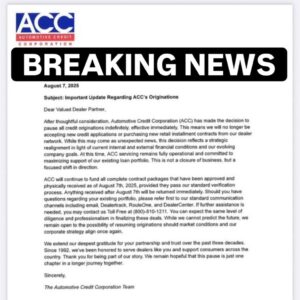–
August 12, 2025 – Its no surprise that subprime auto loan asset backed securities (ABS) have been taking a beating over the past year. But just how bad is it? Bad enough that a 33-year veteran in this space has placed a pause on all new loan originations. So how does this affect the repossession industry?

On August 7, 2025, Automotive Credit Corporation (ACC), a 33-year-old regional auto lender specializing in subprime lending, announced an indefinite pause on all new loan originations, citing “internal and external financial conditions” and a “strategic realignment.” This sudden decision, effective immediately, has sparked concerns about the stability of the subprime auto finance sector.
As ACC continues to service its existing loan portfolio but halts new lending, this article examines the implications for the auto finance industry, details ACC’s 2024 loan activity, portfolio size, primary states of operation, and theorizes how this pause may affect repossession assignment volume in the future.
Background: ACC’s Pause and the Subprime Lending Environment
Founded in 1992 and headquartered in Southfield, Michigan, Automotive Credit Corporation has been a significant player in subprime auto lending, purchasing installment contracts from independent and franchised automobile dealers for consumers with limited or challenged credit histories. ACC operates in 20 states, serving thousands of dealers nationwide. The pause in new loan originations comes amid a challenging subprime auto lending environment, characterized by:
Rising Delinquencies – Subprime auto loan delinquencies reached a record 6.6% in January 2025, the highest since 1994, driven by high interest rates (20–30% for subprime loans), elevated vehicle prices, and inflationary pressures.
Funding Challenges – The subprime auto asset-backed securities (ABS) market has weakened, with widening spreads and reduced institutional investor interest, while banks have tightened funding lines.
Repossession Surge – Vehicle repossessions hit 1.73 million in 2024, a 16% increase from 2023 and 43% from 2022, reflecting widespread borrower distress.
ACC’s pause is not a complete exit, as the company will continue servicing existing loans and fund pre-approved contracts received by August 7, 2025. However, the indefinite suspension signals potential financial or strategic difficulties, raising concerns about the broader subprime lending sector.
ACC’s 2024 Loan Activity and Portfolio Size
Exact data on the number of car loans ACC originated in 2024 is not publicly available, as the company is privately held and does not disclose detailed origination figures. However, given ACC’s focus on subprime lending and its network of thousands of dealers across 20 states, it likely originated thousands of loans annually.
The U.S. auto loan market was valued at USD 676.20 billion in 2025, with subprime loans (including deep subprime) comprising about 2.8% of total loan balances in 2024. As a significant player in this segment, ACC’s 2024 originations likely numbered in the tens of thousands, though precise figures remain proprietary.
Regarding portfolio size, ACC has raised $560 million in total funding, including $281 million in debt financing in July 2022. Estimates suggest its 2024 loan portfolio was substantial, potentially in the range of hundreds of millions of dollars, supported by its 280 employees and estimated annual revenue of $28.8 million. Specific portfolio size data is not publicly disclosed, reflecting ACC’s private status.
Primary States of Operation
ACC operates in 20 states, with a strong presence in key markets, including:
Michigan – Home to ACC’s headquarters in Southfield, a hub for automotive finance.
New York – A significant market with high subprime borrower demand.
Illinois – A key region for auto sales and financing.
Florida – A large market for used vehicle sales, aligning with ACC’s subprime focus.
Texas – A major state for auto lending due to its size and economic diversity.
These states reflect ACC’s focus on regions with high demand for subprime financing, often tied to urban and suburban markets with large populations of non-prime borrowers. Repossession agencies in these territories are the ones most likely to feel the effects of this lending pause.
Impact on Repossession Assignment Volume
Short-Term Effects (6–12 Months)
ACC’s pause is likely to increase repossession assignment volume in the near term due to its focus on servicing existing loans, many of which are held by high-risk subprime borrowers. With subprime delinquencies at 6.6% in January 2025 and repossessions already at 1.73 million in 2024, ACC’s portfolio is vulnerable to defaults.
The company’s continued servicing efforts may lead to a spike in repossession assignments as it seeks to recover collateral from delinquent accounts. This could be amplified by economic pressures like inflation and the end of pandemic-era support programs, which have driven early-stage delinquencies into double-digit levels for some portfolios.
Long-Term Effects (1–3 Years)
Over the longer term, ACC’s halt on new originations could reduce repossession assignment volume. Without new subprime loans, the pipeline of high-risk accounts prone to default will shrink as existing loans are paid off or defaulted.
If other subprime lenders follow ACC’s lead—prompted by funding constraints or rising loss severity—the overall volume of subprime loans could decline, further decreasing repossession opportunities. For example, subprime lending dropped to 14% of total auto loan and lease originations in 2024, and a continued contraction could significantly limit future assignments.
Additionally, a 2024 trend of subprime borrowers intentionally abandoning loans to pursue lower-rate financing (due to declining interest rates) may complicate repossession efforts. These “strategic defaults” could increase assignment complexity, as borrowers may evade recovery to secure new vehicles, though the overall volume may still decline without new loans.
Future Outlook
ACC’s pause could be a temporary response to internal challenges or a sign of broader subprime lending difficulties. If market conditions stabilize—such as declining interest rates or improved loan-to-value ratios—ACC may resume originations, potentially restoring repossession assignment volume.
However, if other lenders scale back, the subprime sector could face sustained contraction, reducing credit access, vehicle sales, and repossession assignments. The surge in delinquencies and economic pressures, like potential tariffs, suggest a cautious outlook for 2025–2026.
Disclaimer – This article is based on information available as of August 12, 2025, and reflects current market trends. Future developments may alter the outlook for the auto finance industry and repossession assignment volumes.
Subprime Lender Pauses Lending: Implications for Repossession Agencies – Subprime Lender Pauses Lending: Implications for Repossession Agencies – Subprime Lender Pauses Lending: Implications for Repossession Agencies
Subprime Lender Pauses Lending: Implications for Repossession Agencies – Repossess – Repossession – Repossession Agency – Repossessor – Repossession – Lending











More Stories
Repo Agent Wrestles Shotgun from Borrower
Breaking the Routine – Finding the Sweet Spot in Weekend Recoveries
Repo Rampage in Rural Texas
ARA Served Letter of Inquiry by Senator Warren
Arrest Made for Attempted Murder of Repossession Agent
Detroit Repo Shooter Sentenced